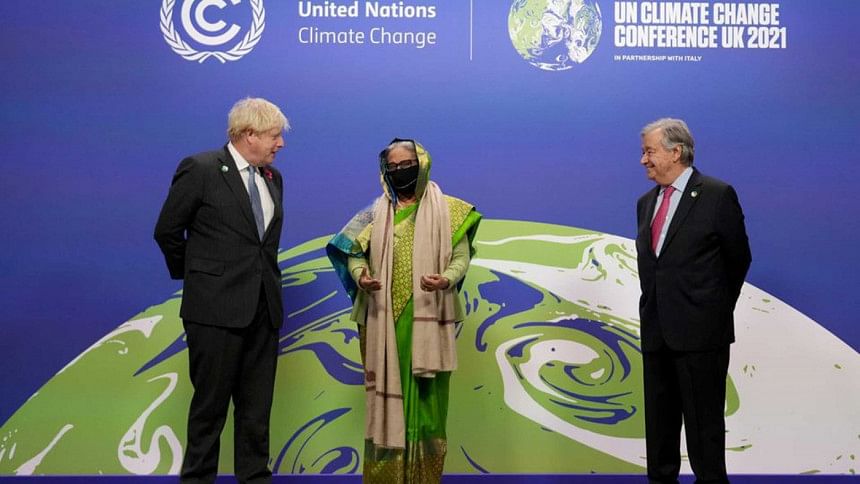COP26: A meta-perspective

Was COP26, held in Glasgow, a success or a failure? It appears everyone has a different opinion about what the two-week-long summit achieved. A sceptic might say that there were a lot of speeches and empty promises, but even a hard-nosed realist like me would have to concede that some important milestones were achieved at the end of the day.
I did not travel to Glasgow because of prior commitments, but also from my previous experience I could tell that, for me, it would have been useless unless I had made a commitment to stay there for the entire duration and attended all sessions, doing a "hop, skip and jump" like an Olympic sportsman to go from one event to another. I would have loved to hear Barack Obama, Alok Sharma and Greta Thunberg speak (although Greta was not "officially" invited, according to media reports). However, to accomplish these goals, I would have had to be like Superman, flying from one arena to another while keeping track of time and my physical limitations.
The good news is, from a distance, I was able to keep abreast of everything that was accomplished, as well as the shortcomings. I know now that the 1.5 degrees Celsius target is not achievable. Net zero by 2050 was not very likely to start with, and the poorer nations will get only a fraction of what they need to achieve all the mitigation and adaptation targets. On the other hand, we will see an end to deforestation, a possible end to the tyranny of fossil fuel by the turn of this century, and greater commitment to collaboration between nations to reduce carbon emissions.
One thing was clear even before the gathering at Glasgow began. There was an over-expectation. The international climate summit was billed by its chief organiser as the "last, best hope" to save the planet. The climate summit remains "our last, best hope to keep 1.5 in reach," said Alok Sharma, the British government minister chairing the climate talks. "We must make it a success," said Patricia Espinoza, Executive Secretary of the United Nations Framework Convention on Climate Change (UNFCCC).
Was COP26 a success, then? For the "the glass is half full" school, i.e., the optimist, there are reasons to celebrate. Some major agreements were reached, the conference ended without any major disappointments, and it ended peacefully. However, the media has declared that "the glass is half empty", or the summit was full of empty promises, with no major tangible achievement to show for it. The conference was mocked by some as a jamboree with all talk and no substance.
The statistics for COP26 is, nonetheless, impressive. A total of 197 countries participated and the participants ranged from "heads of state and titans of industry" (New York Times) to over 100,000 demonstrators from different walks of life chanting for "immediate action" at Glasgow Green.
Around 105 countries agreed to reduce emissions of methane—a short-living but powerful greenhouse gas—by 30 percent by 2030, as compared with 2020. More than 130 countries pledged to halt and reverse deforestation and land degradation by 2030.
More than 40 countries, including Canada, Poland, South Korea and Ukraine, have agreed to phase out their use of coal-fired power, the dirtiest fuel source. Our neighbour, India, which is the world's fourth largest emitter, pledged to join the net-zero club by 2070.
India's 2070 commitment was soon blown out of the sky by its other neighbour, Pakistan. Malik Amin Aslam, an adviser to the prime minister of Pakistan, scoffed at some of the long-term net zero goals being announced. "With an average age of 60, I don't think anyone in the negotiating room would live to experience that net zero in 2070," he said.
There were plenty of sceptics, including Greta Thunberg of Sweden, who lampooned the "blah blah blah", i.e., the big speeches. "It is not a secret that COP26 is a failure," she said. "This COP26 is so far just like the previous COPs—and that has led us nowhere," Thunberg said as she addressed climate activists who had gathered at Glasgow.
Just as the negotiations at Glasgow got underway, a report from the United Nations (UN) poured cold water on the pledges made by the nations to cut greenhouse gas emissions. Analysts at the UN tallied up the Nationally Determined Contributions (NDC), the plans to curtail emissions over the next decade, and estimated that the world was on track to heat up roughly 2.7 degrees Celsius above preindustrial levels by 2100. "To limit warming to just 1.5 degrees Celsius, the UN said, global emissions from fossil fuels need to plummet by roughly half between 2010 and 2030. Instead, emissions are set to rise over that period," according to the New York Times. Actually, emissions will increase by 13 percent by 2030.
"The reality is you've got two different truths going on," said Helen Mountford, vice president for climate and economics at the World Resources Institute (WRI), a think-tank in Washington, DC. "We've made much more progress than we ever could've imagined a couple of years ago. But it's still nowhere near enough," she said.
A more recent report by the International Energy Agency (IEA) is less alarming though. IEA estimates suggest that all the climate pledges announced to date, if met in full and on time, would be enough to hold the rise in global temperatures to 1.8 degrees Celsius by 2100. In order to succeed, what is required in the coming decades is stronger implementation, and clearer tracking or monitoring.
Dr Abdullah Shibli is an economist and works in information technology. He is also Senior Research Fellow, International Sustainable Development Institute (ISDI), a think-tank based in Boston, USA.

 For all latest news, follow The Daily Star's Google News channel.
For all latest news, follow The Daily Star's Google News channel. 



Comments